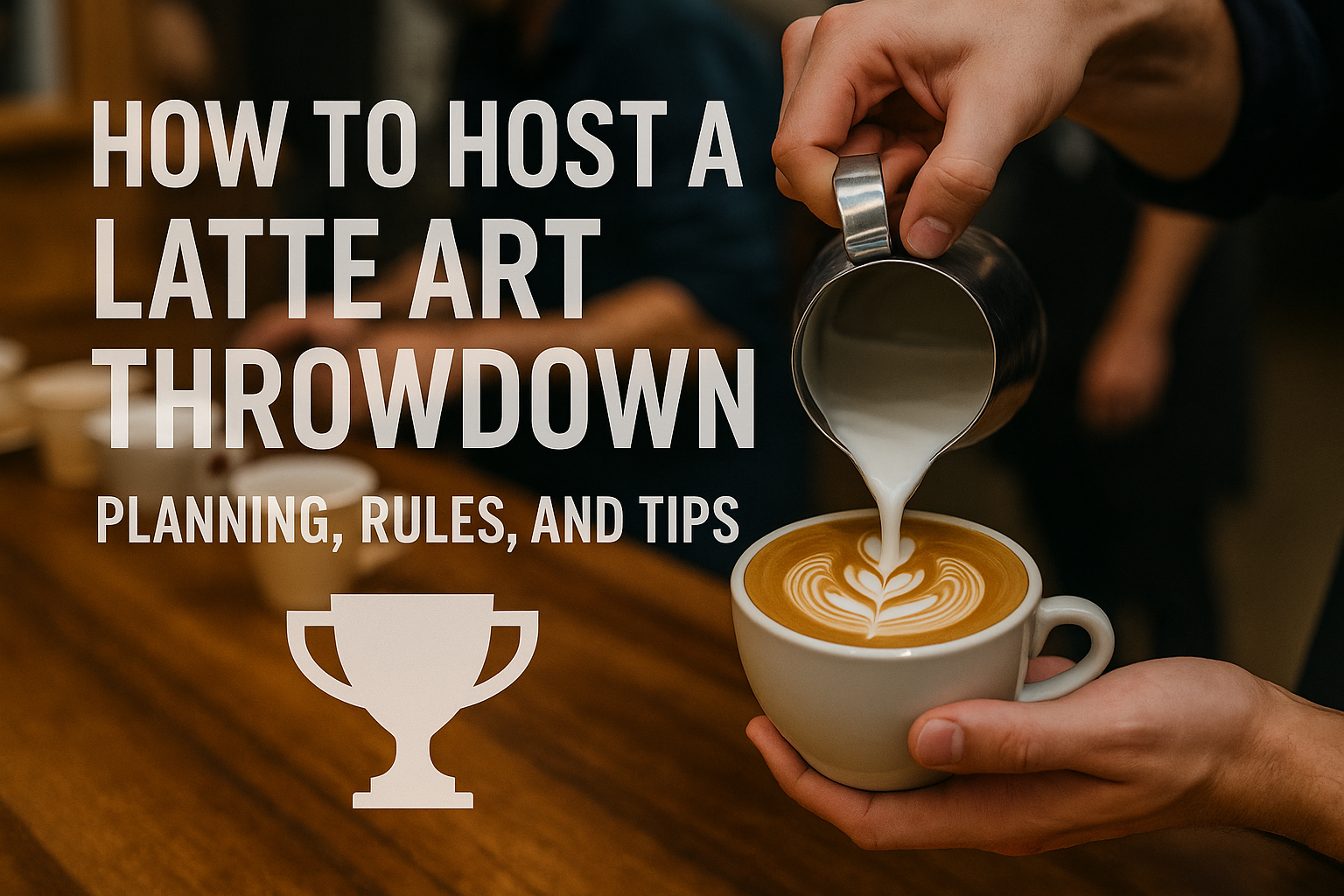Latte art throwdowns have become a celebrated part of specialty coffee culture.
More than just competitions, these events foster community, spark creativity, and elevate the skills of baristas around the world.
Whether you’re planning your first local throwdown or looking to level up an existing format, this guide will walk you through everything you need — from planning and promotion to rules, judging, and post-event engagement.
Hosting a successful throwdown isn’t just about crowning the best rosetta or tulip — it’s about building relationships, celebrating the craft, and energizing the culture of coffee.
What Is a Latte Art Throwdown?
A latte art throwdown is a live, head-to-head competition where baristas showcase their milk pouring skills in front of an audience. It’s typically fast-paced, fun, and informal.
Participants are usually paired in brackets. Each round, they pour a latte side by side, and a panel of judges or audience selects the winner, who moves on to the next round.
It’s part performance, part pressure, and all passion. These events can be hyper-local, citywide, or even part of international barista circuits.
Why Host a Latte Art Throwdown?
Throwdowns offer a unique opportunity to:
- Celebrate the local coffee community
- Build relationships among baristas and cafés
- Promote your brand or venue
- Develop barista skills and confidence
- Attract coffee lovers and potential customers
Beyond the competition, these events reinforce the importance of craft, technique, and the shared joy of coffee.
Step-by-Step Guide to Hosting Your Throwdown
Let’s break down everything you need to plan and execute a successful event.
Step 1: Define the Vision and Format
Set Clear Goals
What is the purpose of your event?
- Friendly competition?
- Brand awareness?
- Fundraiser?
- New café launch?
Having a clear goal helps shape every decision, from budget to promotion.
Choose a Format
Popular formats include:
- Single Elimination Bracket: The most common format. Losers are eliminated each round.
- Double Elimination: Offers a second chance, ideal for larger or more competitive events.
- King of the Hill: One winner stays at the machine while challengers rotate.
- Freestyle Rounds: Encourage creative or abstract pours.
Consider time limits, difficulty progression, and final round structure.
Step 2: Choose a Venue
Most throwdowns are hosted at cafés, roasteries, or shared event spaces. Your venue should have:
- At least two espresso stations
- Reliable power and water supply
- Good lighting and audience visibility
- Room for 30–100 people depending on scale
- Seating or standing room for spectators
- Music and microphone setup
Make sure the environment supports both the technical side of the competition and the social atmosphere.
Step 3: Gather Equipment and Supplies
You’ll need:
- Espresso machines (2 identical models if possible)
- Grinders
- Jugs/pitchers
- Cups (usually 6–8 oz)
- Milk (oat and cow options for inclusivity)
- Towels and cloths
- Tamping mats
- Rinse stations
- Shot timers or stopwatches
- Judging table
- Registration forms or digital sign-up
Consider recruiting gear sponsors to reduce costs or provide product visibility.
Step 4: Recruit Judges and MC
Judges
Ideally, have 3 judges with latte art experience or visual tasting skills. They’ll judge based on:
- Symmetry
- Contrast
- Definition
- Difficulty
- Overall impression
Optional: Include a guest judge (influencer, chef, or customer) for fun and audience engagement.
Emcee (MC)
An energetic MC is key. They:
- Introduce competitors
- Engage the audience
- Explain the rules
- Keep the energy up between rounds
Choose someone confident, coffee-savvy, and entertaining.
Step 5: Promotion and Registration
Set a Date and Time
Thursday or Friday nights tend to work best. Avoid overlapping with other coffee events.
Create a Promo Plan
- Social media countdowns
- Posters and flyers at cafés
- Partner with local coffee brands
- Email invitations to baristas and roasters
Use a dedicated hashtag (e.g., #LatteBattleSP) and promote through café and barista channels.
Sign-Up Options
Allow pre-registration via Google Forms or Eventbrite, plus limited walk-ins. Cap entries at 16, 32, or 64 to fit your format.
Step 6: Event Day Checklist
Before Guests Arrive:
- Test all machines and grinders
- Place signage and bracket board
- Prep cups and pitchers
- Check lighting and audio
- Assign volunteers to timekeeping, refilling milk, and cleaning
During the Event:
- Start with a welcome speech and rules overview
- Ensure baristas follow health/safety protocols
- Announce matchups clearly
- Keep rounds flowing smoothly
- Encourage cheers, photos, and audience voting (if used)
Prizes and Incentives:
- Trophy or custom tamper
- Gift cards
- Coffee gear
- Sponsored items
- “Crowd Favorite” or “Best Newcomer” awards
Step 7: After the Throwdown
Celebrate All Competitors
Everyone who participated deserves recognition. Thank them personally and on social media.
Share Photos and Videos
Post highlights within 24 hours to keep momentum. Tag participants and sponsors.
Request Feedback
Ask attendees and competitors what went well and how to improve. Use this to refine future events.
Stay Connected
Create a follow-up post, newsletter, or even a highlight reel to build community and encourage future participation.
Tips for Making Your Throwdown Memorable
1. Themed Rounds
Add fun challenges like:
- “Blind pour” with eyes closed
- “One-handed pour”
- “Freestyle art” with oat milk
2. Music and Food
Create a vibe with a live DJ, playlist, or band. Offer snacks, pizza, or drinks for sale (or free with registration).
3. Merch and Branding
Print event T-shirts, sponsor banners, or limited-edition mugs. These become keepsakes and marketing tools.
4. Barista Spotlights
Introduce competitors with a mini bio — where they work, favorite drink, latte art style. This makes the audience more invested.
The Bigger Picture: What a Throwdown Can Build
A latte art throwdown isn’t just a competition — it’s a launchpad.
It can:
- Attract new customers to your café
- Strengthen team culture and morale
- Establish your café as a community hub
- Create career opportunities for baristas
- Support causes (many throwdowns double as fundraisers)
The return on energy, even from a modest event, can be immense.
More Than a Competition — A Celebration of Craft
Hosting a latte art throwdown is more than organizing a bracket and handing out prizes.
It’s about celebrating the baristas behind the machine, showcasing skill and creativity, and bringing together a community that thrives on shared passion.
Whether your goal is to inspire, connect, or simply have fun, a well-executed throwdown leaves a lasting impression.
It turns routine into ritual, latte into performance, and cafés into gathering spaces filled with artistry, laughter, and espresso steam.
So go ahead — plan that throwdown. Invite your community, crank the music, and let the pours begin.

Artur is a coffee enthusiast and content creator passionate about barista techniques and coffee culture. With a sharp eye for detail and a love for learning, he shares practical tips, brewing guides, and gear insights to help readers elevate their coffee experience — from home brewers to aspiring professionals.
